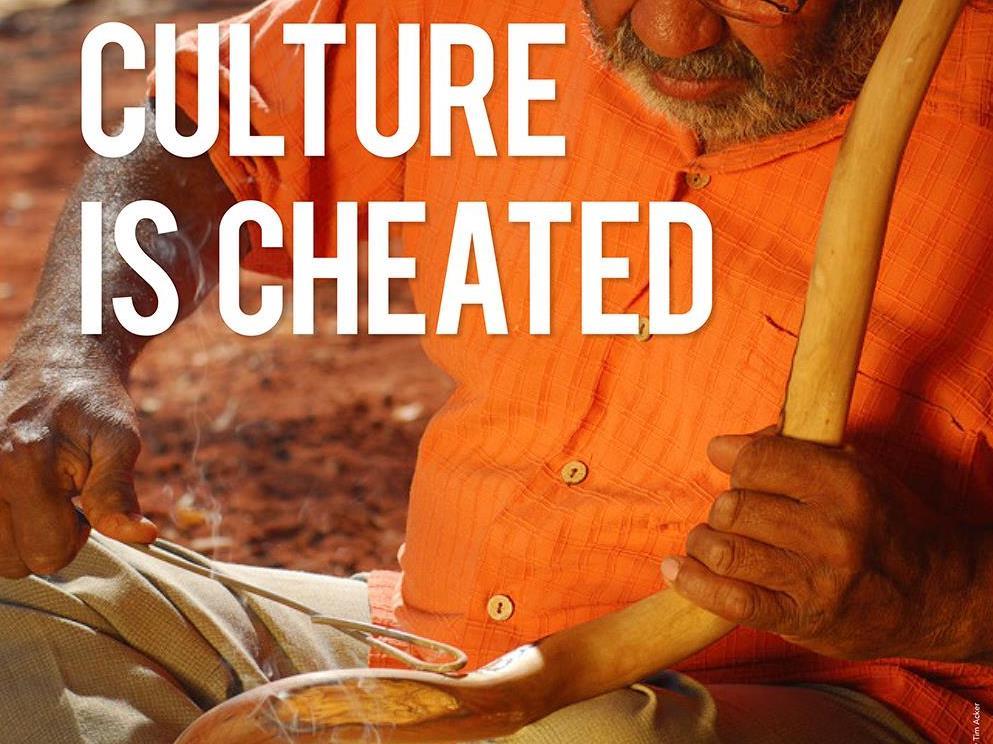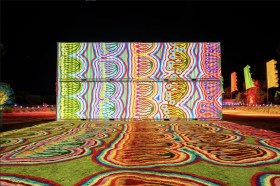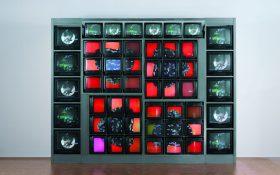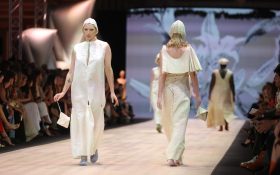Supplied: Arts Law Centre of Australia
Last August, at the Darwin Aboriginal Art Fair, three organisations – The Arts Law Centre of Australia, the Indigenous Art Code and Copyright Agency | Viscopy – joined forces to launch the ‘Fake Arts Harms Culture’ campaign. Its aim was to send the message that commercial ‘Aboriginal style’ objects and artworks will no longer be tolerated. The campaign was paired with a change.org petition, initiated by an individual, which drew over 13,000 signatures in support.
Read: War declared on fake Indigenous art
That fight escalated at the hand of Queensland Member for Kennedy, Bob Katter, who introduced a Private Members Bill to Parliament in February: the Competition and Consumer Amendment (Exploitation of Indigenous Culture) Bill 2017, intended to outlaw the sale of fake foreign imports in Australia. It was seconded by fellow crossbencher, NXT Lower House Member, Rebekha Sharkie MP.
Katter said: ‘There is a huge industry using “our” name as Kalkadoon and First Australians for these cheap inferior replicas and paying us First Australians nothing for the privilege.
‘The Government sold our industries, our public assets, and now they’ve managed to sell our own culture.’
In August 2017 the House of Representatives Standing Committee on Indigenous Affairs established an inquiry into the growing presence of inauthentic Aboriginal and Torres Strait Islander ‘style’ art and craft products and merchandise for sale across Australia.
Katter’s bill was reintroduced to Parliament in September.
The campaign has escalated over recent months, and submissions in support of the new legislation close this week.
The deadline in support of that Inquiry close on Friday 3 November 2017. Make your submission at: www.aph.gov.au/inauthenticart
Why is your support important?
It is reported that up to 80% of tourist shops and markets sell ‘Aboriginal style’ souvenirs, with some using products imported from Indonesia. A discussion paper prepared by the Arts Law Centre states: ‘A mystery shopping exercise in tourist locations in various capital cities found very large numbers of such items and estimates suggest this is a multi-million dollar market.’
Under Australia’s Competition and Consumer laws it is not illegal for ‘Aboriginal Style’ imports to be sold, so long as they do not claim to be authentic and have a label stating where they are made.

CEO of the Arts Law Centre of Australia, Robyn Ayres said: ‘We consider it practical and appropriate to extend consumer protection laws [which draw] on the existing expertise and regulatory powers of the ACCC.’
The organisation formally supported Katter’s proposed legislation, with the statement: ‘This practice, which is largely aimed at tourists, deprives Indigenous communities and artists of control of their cultural heritage as well as fair payment for their work. It also disadvantages consumers who believe they are buying genuine works and those ethical suppliers who make the commitment of only stocking authentic Indigenous art products and merchandise.’
Yolngu Artist, Banduk Marika put a personal spin on the campaign. ‘Our art is our resource, it belongs to us, we use it in a ceremonial context; it is a resource for our survival. If control of that resource is taken away from us, we cannot meet our cultural obligations; we cannot use it for our families benefit.’
The new Bill will require the establishment of a new committee appointed by the Minister and is representative of Indigenous communities to monitor compliance with the Act.
The deadline in support of the Inquiry into inauthentic Aboriginal and Torres Strait Islander art closes on Friday 3 November 2017. Make your submission at: www.aph.gov.au/inauthenticart





